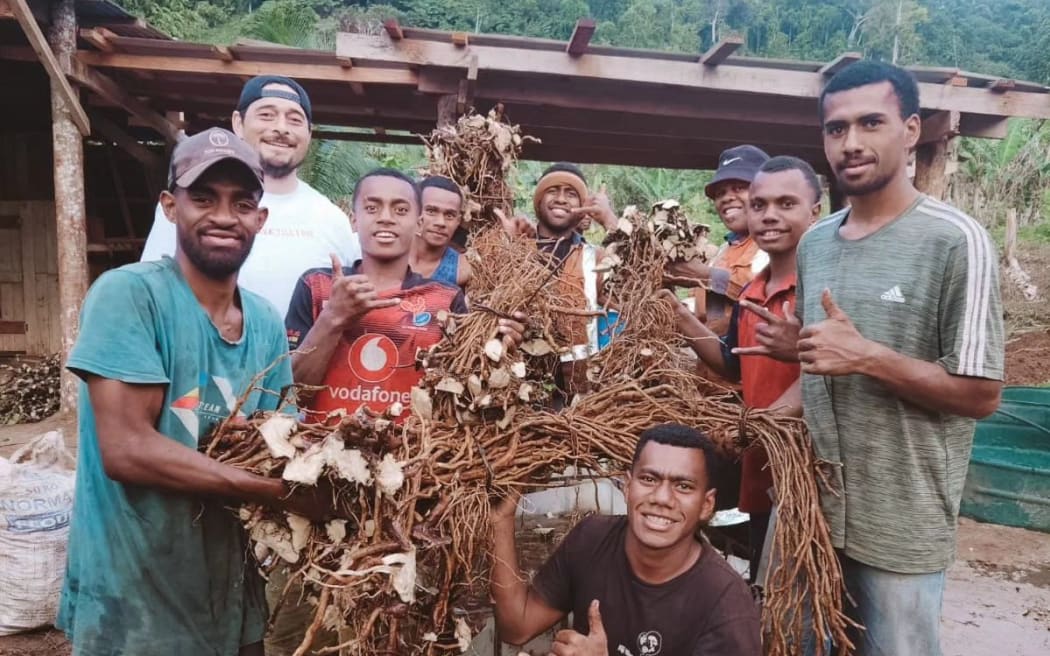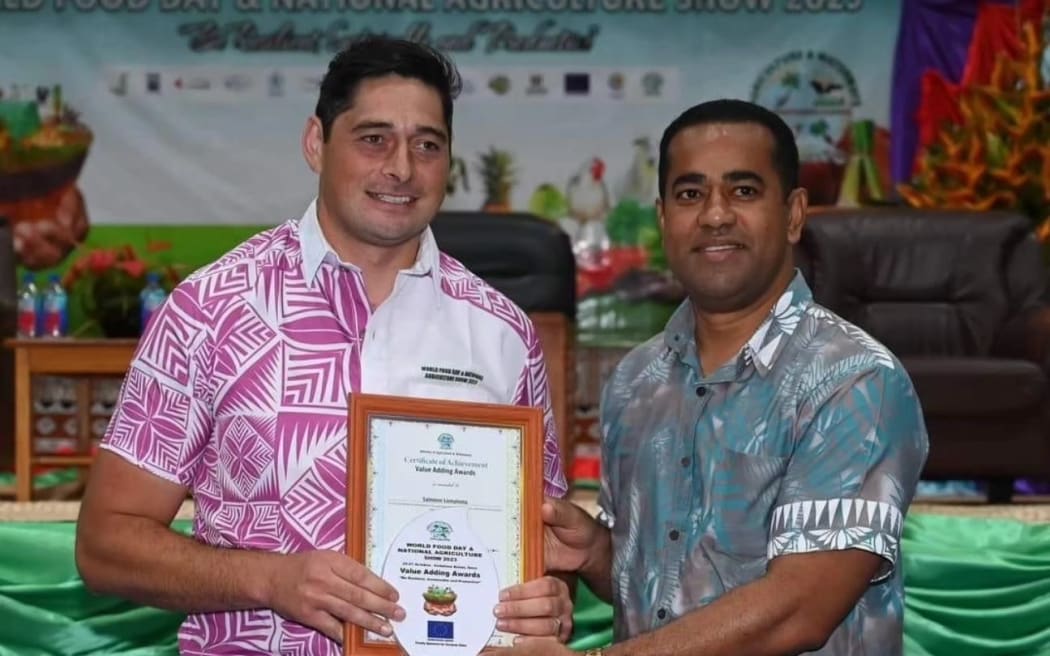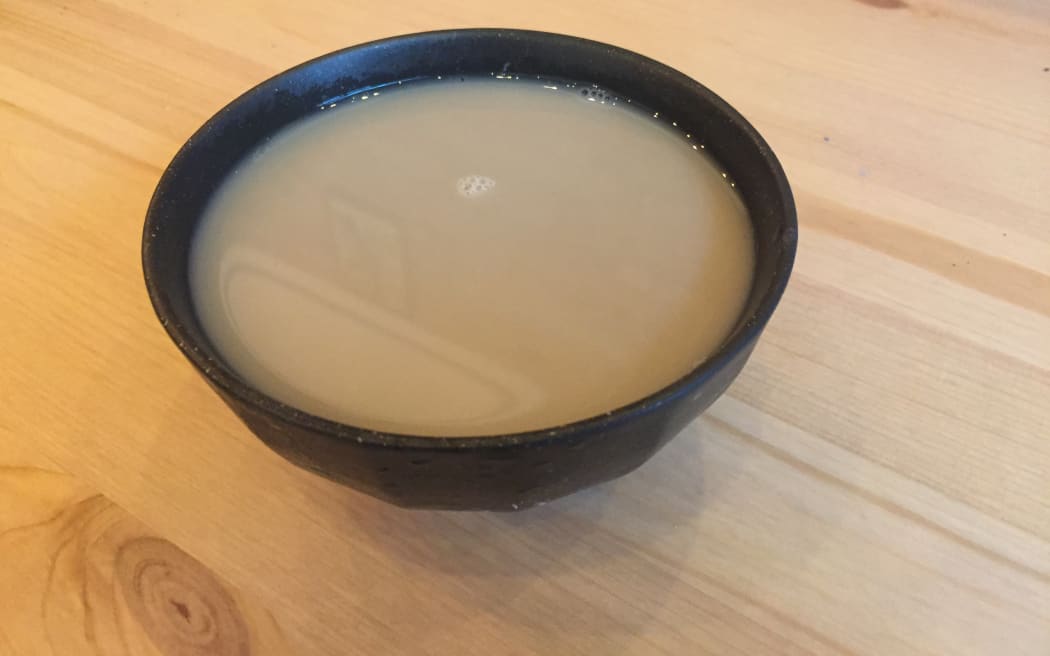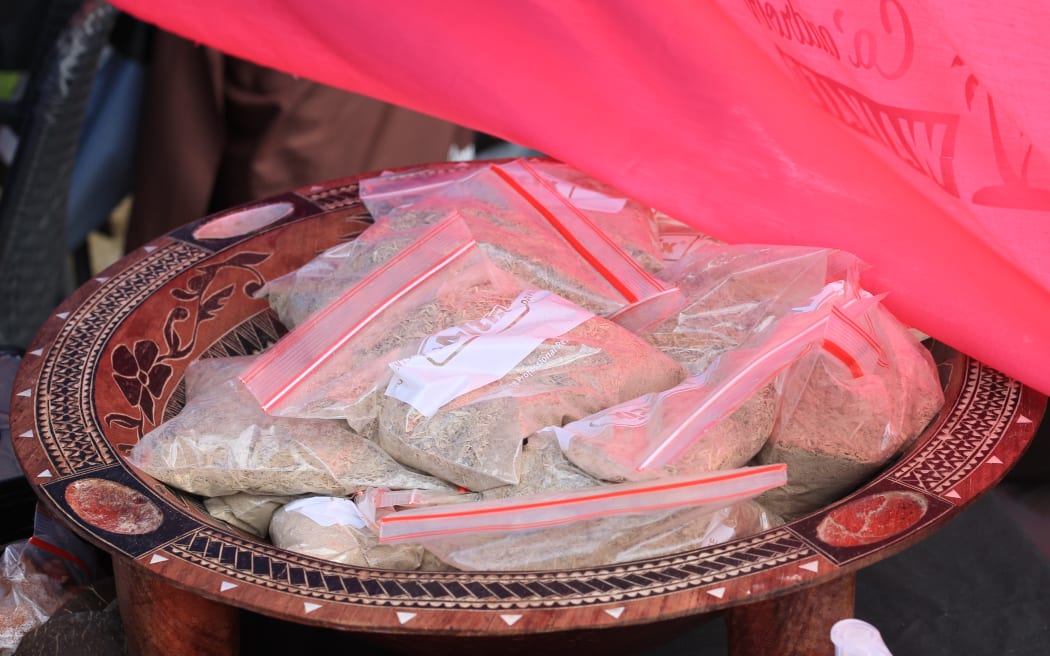
Saimon Lomaloma, back left in white t-shirt, the owner of Wakanavu Kava in Fiji, says the natural remedies space is growing, as people begin to realise kava's health benefits. Photo: Wakanavu Kava
Fiji's top kava farmer for 2023 says the "untouched" flavoured kava drink market in New Zealand can become a big draw for Pacific kava exporters.
Saimon Lomaloma, who was selected Fiji's Kava Farmer of 2023 in October, believes there is so much potential for kava exports to the United States of America as well.
Speaking to RNZ Pacific, Lomaloma said the "untouched flavoured kava drink market in Australia and New Zealand are currently restricted" by strict food standards.
This stops the mixing of kava with anything else apart from water.
"One of the biggest challenges for the growth of kava and the Australian and New Zealand market is the restrictive food standards on not allowing kava to be mixed with anything other than water," he said.
"So, for example, you cannot sell kava powder that's mixed with pineapple or mango flavoring.
"I could go down to the supermarket and I could buy some freeze-dried pineapple powder and mix that with kava, it would be a lot more appealing to the emerging market to have flavored kava drink.
"But as it stands, it's illegal in Australia and New Zealand and I believe it's off the back of abuse of kava with alcohol.
"You go to a bar and it's great now that we have non-alcoholic beverages being beer and other non-alcoholic drinks...like you could have a Steinlager pure and Heineken zero. But you know it would be great to be able to go to a bar and have a kava mocktail. But that's illegal in New Zealand and Australia."
To go past that stage will still need a lit if work done by all stakeholders.
Some kava exporters now turn to neutraceuticals as another option.
Neutraceuticals are products derived from food sources with health benefits in addition to the basic nutritional value found in them.

Fiji's Kava 2023 Farmer of the Year, Saimon Lomaloma, left. Photo: Wakanavu Kava
Growing US markets
Lomaloma believes that is another way to go, which is also a growing market, especially in the United States and slowly getting into some European markets.
Most products are used to ease anxiety.
"I believe also to adding on to the prospects you've got nutraceutical market in which there's brands that are popping up now with kava pills," he said.
"So using kava extract, you can have kava pills that are of a lower strength, which you would take during the daytime. And that would take the edge off and ease the anxiety that people may face.
"And then you can take what may be a double dosage at night-time and that assists with sleeping."
For many people that are having trouble with sleep and anxiety to be able to take something that's natural to help with their daily lives, then there's a lot of growth for kava and that natural remedies space, he said.
Lomaloma, who grows his own supply and produces under Wakanavu Kava, exports to the US market.
He has two farms on Vanua Levu, where his dad is from.
The farms are 80 percent operated and worked by locals around the Buca Bay and Natewa Bay areas, with the other 20 percent being skilled workers who help in the overall operation and management of the business.
Lomaloma says the US market is also lucrative and diverse.
"I believe there's different markets within the US and you have the Pacific diaspora living in the US and it is a huge big market. And that's controlled quite tightly by importers in the US that have established links within the US to distribute.
"Then you have the likes of e-commerce with Amazon and there's majority of those US brands that import from the Pacific."
He believes the e-commerce industry is good as it self-regulates and clients are able to have their say on qualities of kava they buy.
"It's quite a lucrative market for them. But again it's self-regulating in the sense that through Amazon, you have reviews. So if you buy kava and there was an issue with the quality of the kava you would put a comment on that listing of the kava," Lomaloma said.
"So I guess that would fix that issue."

Photo: RNZ Pacific/ MacKenzie Smith
The other market which is opening up in the US us the emergence of kava bars, which Lomaloma said was getting popular.
"I would call [kava bars] the emerging market, which I think predominantly are based in Florida, and slowly grown throughout the other states," he said.
"I believe there's about eight kava bars just in New York alone. And, there's a couple of hundred I believe within the Florida state which are non-alcoholic bars, serving kava.
"This is potentially a growing market."
Kava bars have also sprung up in cities around New Zealand and Australia.
Kava support
Meanwhile, other kava exporters from around the region have also expressed solidarity in working to meet food standards put in place by the Food Agriculture Organisation (FAO) and markets like Australia and New Zealand.
They are also pushing for the Pacific Islands Forum Secretariat and the Pacific Community to start the work of developing a proposal for a regional Geographical Indicator to be considered by the Forum Economic Ministers Meeting (FEMM) and the PIFS leaders.
A group called the Pasifika Kava Forum, inclusive of major kava farmers and exporters from Fiji, Tonga, Samoa, Solomon Islands and Vanuatu, wants Forum leaders to take up the kava issues as part of trade talks with their counterparts in Australia, New Zealand, the USA, Canada and Europe.
One of the Forum members and a major kava by-products exporte, The FijiKava Limited, had launched a tissue planting facility in Levuka in 2019 to ensure they were able to grow quality kava seedlings that would them be supplied to other farmers who would then grow them for the company to buy off later for export.

Photo: RNZ Pacific / Sela Jane Hopgood

